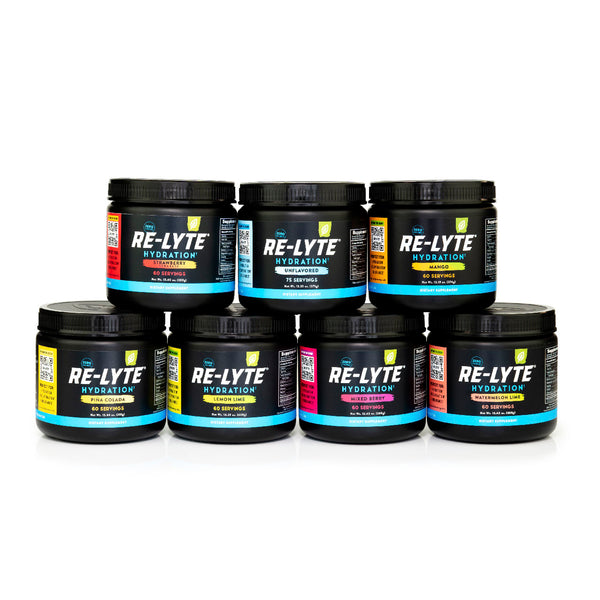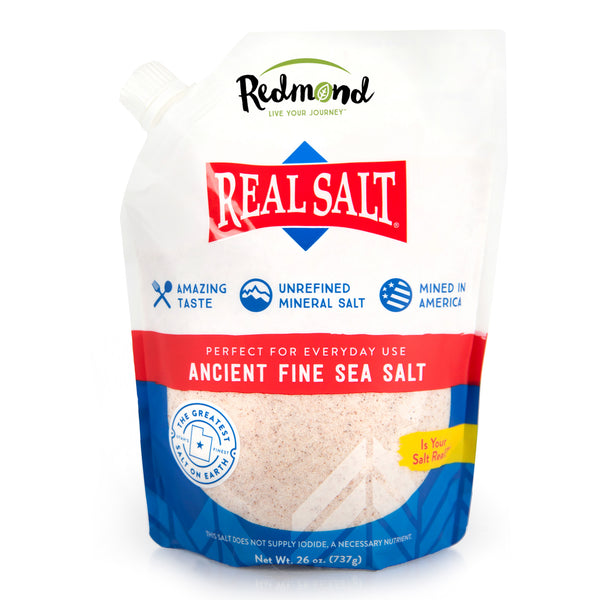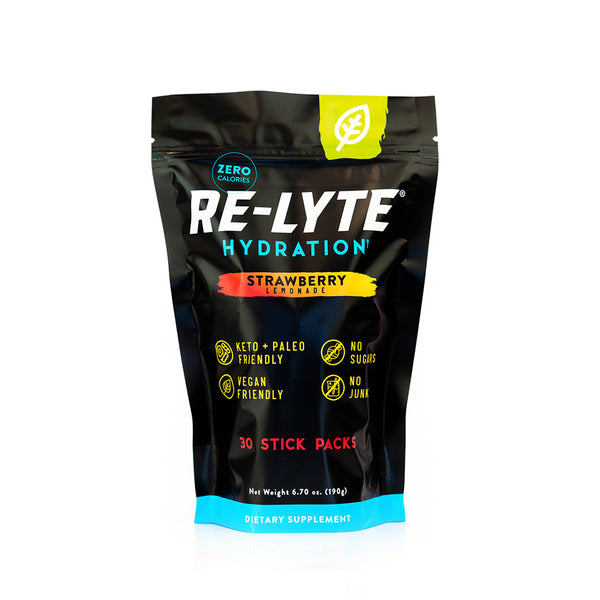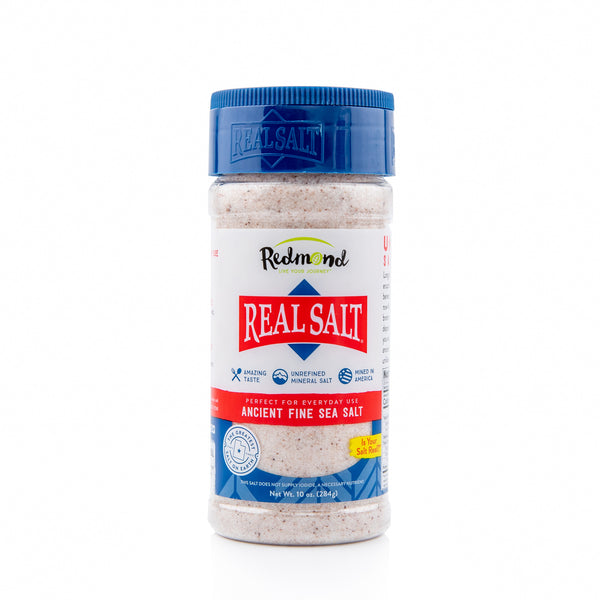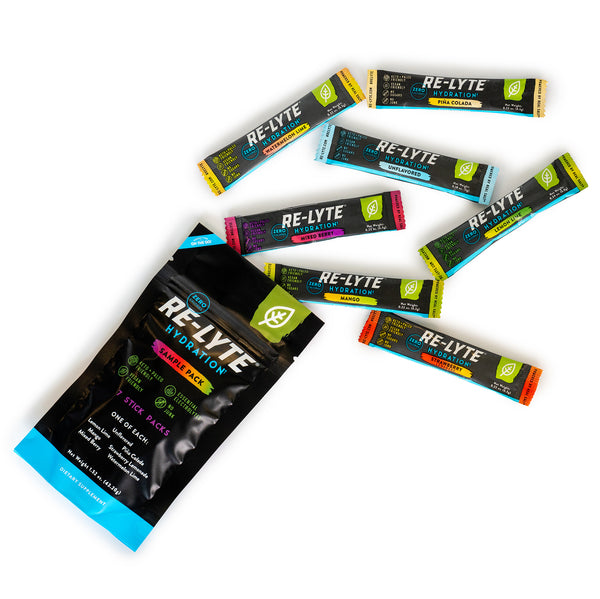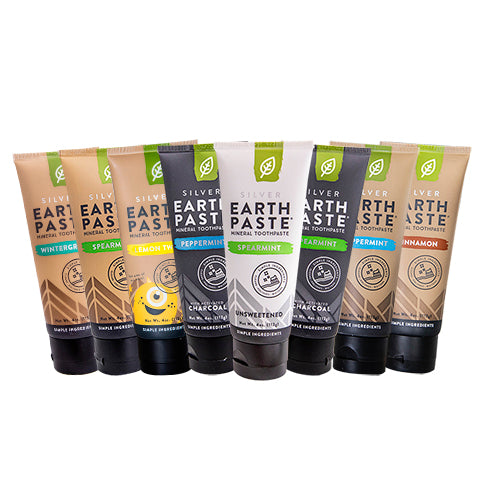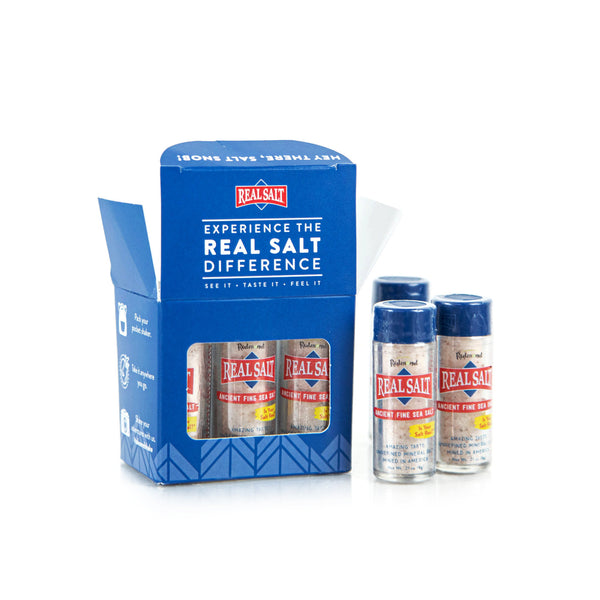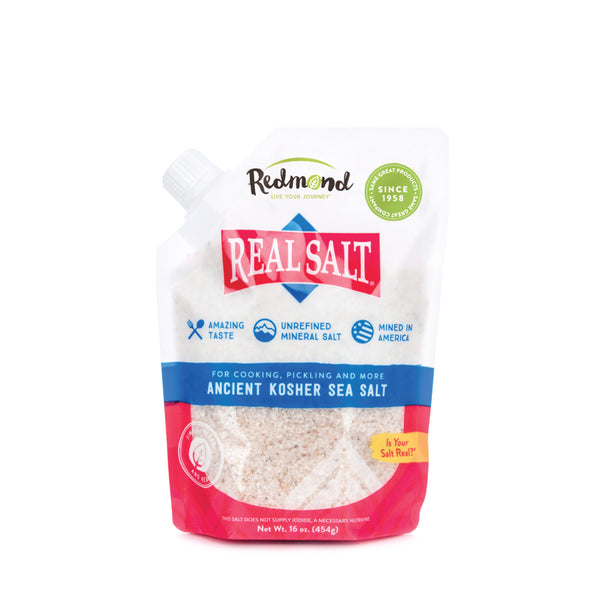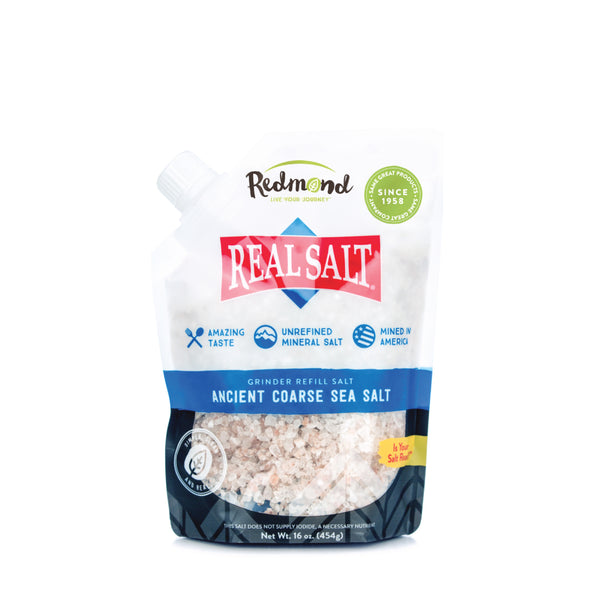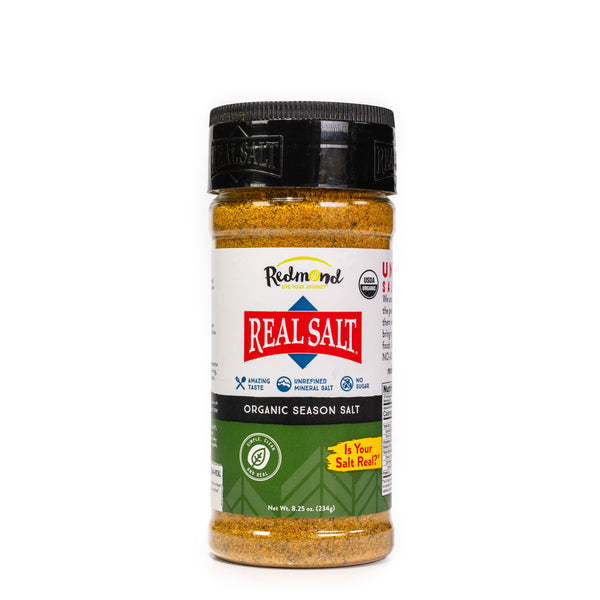What's the Difference Between the Real Salt Grain Sizes?

Article at a Glance:
- Redmond Real Salt comes in four different variations of grain sizes: fine, kosher, coarse, and powder.
- No matter what grain size you use, you'll get the same health benefits but each variation has a unique way of enhancing your recipes.
- In the salt world kosher salt refers to the grain size, but Real Salt products are also kosher certified for religious use.
- Real Salt Ancient Fine Salt is Redmond's most popular grain size and can be used in any recipe or on top of any meal. When in doubt, opt for Fine Salt.
Salt is...well...salt, and that’s about all there is to say about it, right? It’s just that white stuff on the table at every diner that makes food taste better?
No way!
While generic, white table salt might be the most popular and familiar type of salt to us Americans, it’s not even remotely the only kind of salt, and far from the best type of salt. In fact, thinking of salt as “white, iodized, table salt” is a colossal overgeneralization. If you’ve been used to thinking of salt in this way, get ready to have your world rocked.
All of Redmond Real Salt is harvested in large crystals from the same ancient sea bed in Utah and contains the same trace minerals. Regardless, there are still several variations of salt.
How can this be?
The variations in types of salt don’t lie within its inherent chemical and mineral structure, but rather in its grain size. After Redmond Real Salt is harvested, it’s ground down to a particular grain size, giving different types of salt different textures, sizes, and uses.
All of the pink sea salt at Redmond is mined from the same ancient sea bed in Utah, never processed or chemically treated, and rich with 60 different trace minerals. It’s also recommended by fitness experts, medical professionals, and top chefs for its exquisite flavor and unrefined minerals.
The only difference in our salt variations is the grain size. No matter what kind of salt you purchase, you’ll experience the same health benefits. However, different grain sizes play a significant and diverse role in cooking. You will want to pick the right grain size, depending on how you want to use your salt.
This article will take a deeper dive into four different, mineral-rich types of salt harvested by Redmond Real Salt. These salts include fine, kosher, coarse, and powder.
Grain Size: Fine
Fine salt is Redmond Real Salt’s most commonly used salt, and it’s the best-selling sea salt in American health food stores. You can use Redmond's fine salt in any situation where you would use everyday table salt. It’s excellent for seasoning your dishes when you’re done cooking and want to add a healthy mineral to bring out the flavor of your food. Fine salt is also the perfect option to add to a pot of boiling water to get it to boil faster (yay chemistry!), season your pasta (FYI: Italians never cook pasta without salt), or add minerals to your dish.
Most sweet baking recipes call for a pinch of salt. Fine salt is the perfect grain size to add to any cookie, brownie, or other baked good that calls for salt.
Fine-grained salt is available to purchase in salt shakers of various sizes, refill pouches, and even in a bulk bucket and bag. If you’re looking for the perfect everyday salt, Redmond’s fine salt is your best bet.
Grain Size: Kosher
Let’s get the most confusing element of Redmond’s kosher salt out of the way first. Every single grain size of Redmond Real Salt is "kosher certified" and therefore approved for use for those of the Jewish faith. If you’re not familiar with kosher certification, it’s an additional food safety and cleanliness audit. So if you need a certified kosher salt, feel free to use fine, kosher, coarse, or powdered Redmond Real Salt, because they’re all kosher certified by the Orthodox Union.
Kosher, in this context, refers to the actual grain size, which is slightly larger than fine salt, and similar in size to other kosher salts on the market (if you’re curious where kosher salt gets its name from, check out this blog post). Redmond’s kosher salt should be a staple in every pantry, especially if you’re a meat-eater. Kosher salt is the best salt to season meat because it pulls proteins out from the inside, resulting in a perfect caramelization as you cook. Other grains of salt will make your meat taste great, but kosher salt will help you cook it to perfection, without having to worry about an over-salty flavor.
Kosher salt isn’t just for meat lovers. Kosher salt is also the perfect addition to steamed vegetables, soft-baked pretzels, baked potatoes, edamame, and...wait for it...margaritas. Yum.
Grain Size: Coarse
Our coarse salt is one of the bigger grains of salt that we sell. Most people will put coarse salt into a grinder. In fact, our coarse salt comes with a grinder so you can grind your salt yourself.
The purpose of using a grinder for your salt is so you end up with slightly different sizes and textures of salt. The process of grinding coarse salt will give you a variety of good salty textures, bringing out the flavor of your food in unique ways. Some grinders also give you the option to choose the grain size you prefer. A quick switch of the grinder’s setting and you can have powder, fine, or kosher salt at your fingertips.
Even though we often equate bigger things with being stronger or more intense, the opposite is true when it comes to grains of salt and their flavor. Why?
The finer the salt, the more surface area your tongue is exposed to. Think about it this way: if you’re sucking on a piece of hard candy like a Jolly Rancher, your tongue is only exposed to the surface area on the outside of the candy. If you were to grind that Jolly Rancher up into a fine powder and put that in your mouth, your tongue is exposed to the surface area outside and inside the candy. The big piece of candy also dissolves more slowly in your mouth, while the powder version dissolves quickly, intensifying the flavor. The same is true for grains of salt.
Since coarse salt is so large, it has a much milder flavor than fine or powdered salt. It’s great anytime you need a subtle salty flavor and a more dramatic crunchy texture. We think it’s an excellent addition to things like ice cream (seriously), watermelon, papaya, nashi pears, honeydew melon, pizza, and other types of food that are enhanced with a little salty kick.
Grain Size: Powder
Powder salt is the smallest grain of salt we have, and super fine. It’s the perfect grain of salt when you need the flavor but don’t necessarily want the texture. For example, if you’re eating popcorn, you want to experience the texture of the popped kernels and not bite into a hard grain of salt. But, is popcorn delicious without salt? Nope. To get the desired popcorn texture with the perfect flavor, opt for powder salt.
Because powder salt is so fine, it has an intense flavor (see the Jolly Rancher example in the section above). That means a little goes a long way and you can use a fraction of the amount you would use of fine salt, for example.
Think of powder salt kind of like powdered sugar. You most likely wouldn’t sprinkle granulated sugar on your French toast or fresh-baked brownies. That’s a job for powdered sugar. Similarly, you’ll want to use powder salt on snacks and dishes that need a light, evenly-disbursed dusting of flavor.
Bonus! What are Ancient Sea Salt Crystals?
Have you heard of Redmond’s sea salt crystals? If not, stop what you are doing and check them out here. These 1-3 inch crystals are ancient sea salt taken straight from the sea salt mine in Utah. These are broken up from big salt chunks into smaller crystals instead of being ground down to a grain.

The health community loves these crystals for several reasons, but mostly because they are perfect for making Sole water. To make mineral-rich Sole water, follow these steps:
- Grab a handful of Redmond’s ancient sea salt crystals into a container with a non-metallic lid.
- Cover the crystals with purified or spring water.
- Put the lid on the container.
- Let it sit overnight (or for at least two hours).
These salt crystals are also great to have on hand when you’re fasting. As you know, when you’re fasting, it’s easy to get dehydrated and lose essential minerals. If you have an ancient sea salt crystal available to lick throughout the day, it will help you retain your electrolytes and curb your cravings and appetite. These crystals are also natural and calorie-free, so they won’t affect your metabolism negatively while fasting.
What's the takeaway?
No matter what type of Redmond Real Salt you use, you are getting kosher-certified, mineral-rich, pink salt with all the health benefits. The only difference in the type of salt we offer is the grain size. However, grain size is important depending on what you want to do with the salt. For example, you don’t want to use coarse salt on popcorn; you want to use powder salt. Similarly, you don’t want to use fine salt for seasoning meat; it’s better to use kosher.
If you want to enhance your salt and cooking game, add every Redmond Real Salt variety to your cart. And remember, when in doubt, opt for Redmond’s fine salt. You can’t go wrong with our most popular grain size.
Comments (10)

Do u publish a list of the minerals?
Does the salt contain iodine?
———
Redmond Life replied:
Hi Paula! While we don’t add iodine to Real Salt, it does contain trace amounts of naturally occurring iodine. You can see a full 3rd party analysis of the mineral content of Real Salt on our website: https://cdn.shopify.com/s/files/1/0031/8606/5475/files/Real-Salt-Typical-Analysis-October-2021.pdf

Which one contains the most minerals?
Let me know to buy now
———
Redmond Life replied:
Hey Eduard, They all contain about the same amount!
NkdkJdXPPEBannerEnd

I’m looking for the best grain of salt to cure meat with what do you recommend
———
Redmond Life replied:
Hey Ruby, We recommend Kosher salt!
NkdkJdXPPEBannerEnd

Do you still carry 2 oz real salt shakers?
———
Redmond Life replied:
Hey Sharon, We do not! They have been discontinued, but you might be able to find them in stores still!
NkdkJdXPPEBannerEnd

